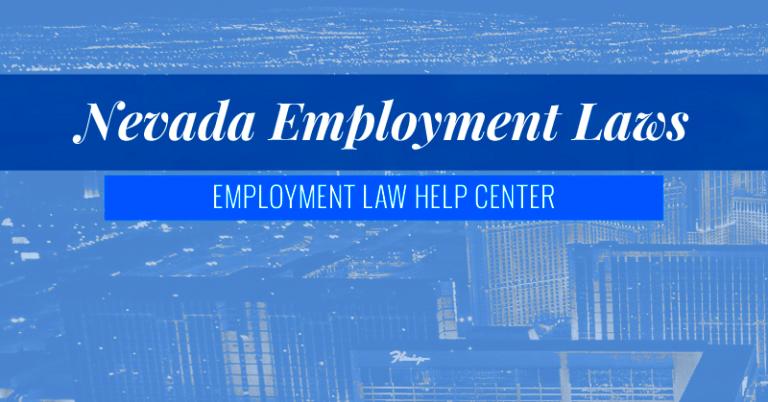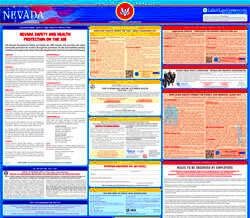Understanding Nevada Employment Laws
Nevada has a unique set of employment laws designed to protect both employees and employers. Understanding these laws is essential for anyone working or hiring in the state. From wage regulations to anti-discrimination policies, Nevada’s employment laws provide a framework that fosters a fair and safe workplace. This blog post will explore key aspects of these laws, helping you navigate your rights and responsibilities as an employee or employer in Nevada.
Employee Rights and Protections in Nevada

Employees in Nevada enjoy a variety of rights and protections. Here are some key points:
- Minimum Wage: Nevada mandates a minimum wage that employers must adhere to, ensuring fair compensation.
- Right to Organize: Employees can join unions and engage in collective bargaining without fear of retaliation.
- Workplace Safety: Employees have the right to a safe working environment, with employers required to follow safety regulations.
- Anti-Discrimination: Nevada prohibits discrimination based on race, gender, age, and other protected characteristics.
- Family Leave: Employees are entitled to family leave under certain circumstances, providing time off for personal matters.
Understanding these rights helps employees advocate for themselves in the workplace.
At-Will Employment in Nevada
Nevada follows the at-will employment doctrine, meaning that both employers and employees can terminate employment for almost any reason, as long as it’s not illegal. Here are some important points regarding at-will employment:
- Flexibility for Employers: Employers can adjust their workforce as needed without facing legal repercussions.
- Employee Rights: While employees can leave a job without notice, they should ensure they are not violating any contractual obligations.
- Exceptions: There are exceptions to at-will employment, including wrongful termination claims based on discrimination or retaliation.
Understanding at-will employment helps both parties navigate their rights and responsibilities in the workplace.
Wage and Hour Laws in Nevada
Nevada has specific wage and hour laws designed to ensure fair compensation for workers. These laws cover various aspects, from minimum wage to overtime pay. Understanding these regulations is crucial for both employees and employers to avoid legal issues and ensure a fair workplace. Let’s dive into the key components of Nevada’s wage and hour laws.
Here are some essential points regarding wage and hour laws in Nevada:
- Minimum Wage: As of July 1, 2023, the minimum wage in Nevada is $10.25 per hour for employees who receive health benefits and $11.25 per hour for those who do not. Employers must comply with these rates.
- Overtime Pay: Nevada law requires employers to pay time-and-a-half for hours worked over 40 in a workweek. This applies to most non-exempt employees.
- Meal and Rest Breaks: Employees are entitled to a 30-minute meal break if they work more than 8 hours. Additionally, they can take a 10-minute break for every 4 hours worked.
- Payday Requirements: Employers must pay employees at least twice a month and provide a written statement detailing hours worked and wages earned.
Being aware of these wage and hour laws helps ensure that employees are compensated fairly and that employers meet their legal obligations.
Anti-Discrimination Policies for Nevada Employees
Nevada takes pride in fostering a diverse and inclusive workplace. The state has strong anti-discrimination policies to protect employees from unfair treatment based on various characteristics. Understanding these policies is vital for promoting a respectful and equitable work environment.
Key aspects of Nevada’s anti-discrimination policies include:
- Protected Characteristics: Employees are protected from discrimination based on race, color, national origin, sex, age, disability, religion, and sexual orientation.
- Harassment: Harassment based on any protected characteristic is prohibited, and employers are required to take steps to prevent and address such behavior.
- Reporting Procedures: Employees who experience discrimination or harassment should report it to their employer or the Nevada Equal Rights Commission (NERC). Employers must have procedures in place to handle complaints.
- Retaliation Protections: Employees are protected from retaliation for reporting discrimination or participating in investigations, ensuring they can speak up without fear.
By understanding these anti-discrimination policies, employees can help create a more inclusive workplace for everyone.
Workplace Safety and Health Standards in Nevada
Ensuring workplace safety is a top priority in Nevada. The state adheres to stringent safety and health standards to protect employees from hazards. Both employers and employees must be aware of these standards to maintain a safe working environment.
Here are some important aspects of workplace safety and health standards in Nevada:
- Occupational Safety and Health Administration (OSHA): Nevada follows OSHA guidelines, requiring employers to provide a safe workplace and report any hazards.
- Employee Rights: Employees have the right to report unsafe working conditions without fear of retaliation. They can also request OSHA inspections.
- Employer Responsibilities: Employers must conduct regular safety training, maintain equipment, and provide necessary safety gear to employees.
- Injury Reporting: Any workplace injury must be reported immediately to ensure proper medical care and compliance with regulations.
By prioritizing safety and health standards, both employees and employers can contribute to a productive and hazard-free workplace.
Termination and Severance in Nevada Employment
Understanding the rules around termination and severance in Nevada is crucial for both employees and employers. In Nevada, employment is generally at-will, which means an employee can quit for any reason, and an employer can terminate employment without notice. However, there are specific regulations and practices regarding termination that everyone should be aware of.
Here are the key points to consider:
- At-Will Employment: As mentioned earlier, Nevada follows at-will employment. This means that either party can end the employment relationship at any time, for almost any reason.
- Wrongful Termination: Employees cannot be terminated for discriminatory reasons, retaliation for reporting violations, or breach of contract. If this occurs, the employee may have a case for wrongful termination.
- Severance Pay: While Nevada law does not require severance pay, many employers offer it as part of their policy. Severance pay can help support employees while they search for new work.
- Final Paychecks: When an employee is terminated, Nevada law requires that they receive their final paycheck within a specified period. If an employee quits, the paycheck is due on the next regular payday.
Being informed about termination and severance laws helps protect employees and ensures employers handle dismissals fairly and legally.
Frequently Asked Questions about Nevada Employment Laws
Many people have questions about Nevada employment laws, especially when they are new to the workforce or starting a business. Here are some common queries:
- What is the minimum wage in Nevada? As of July 1, 2023, the minimum wage is $10.25 per hour with health benefits and $11.25 without.
- Can I be fired for no reason? Yes, in at-will employment, employers can terminate employees for almost any reason, but not for illegal reasons.
- What should I do if I experience discrimination? Report the incident to your employer or contact the Nevada Equal Rights Commission.
- Are there breaks during my workday? Yes, employees are entitled to meal breaks and rest periods based on hours worked.
- What are my rights if injured at work? Employees have the right to report injuries and seek medical treatment without fear of retaliation.
These FAQs help clarify common concerns and encourage employees and employers to familiarize themselves with Nevada’s employment laws.
Conclusion on Nevada Employment Laws
Understanding Nevada employment laws is essential for creating a fair and respectful workplace. From wage and hour laws to anti-discrimination policies, each aspect of these laws protects employees and provides clear guidelines for employers. Being informed can help prevent misunderstandings and ensure a safe and equitable work environment.
Whether you’re an employee advocating for your rights or an employer striving to comply with regulations, awareness of these laws is the key to a successful working relationship. Always remember, when in doubt, consult with a legal professional to clarify any specific concerns about employment laws in Nevada.


